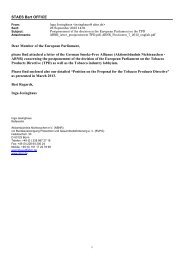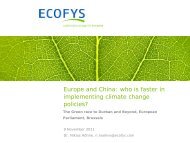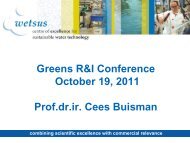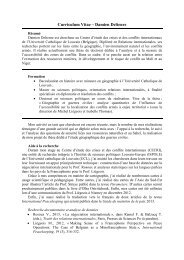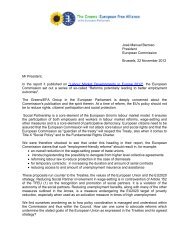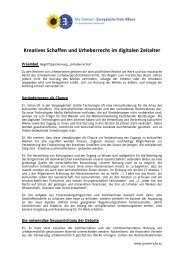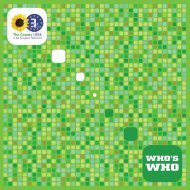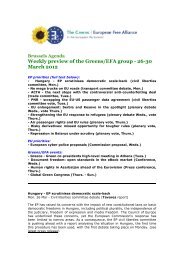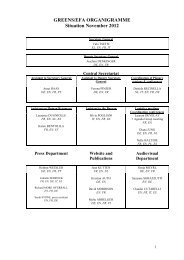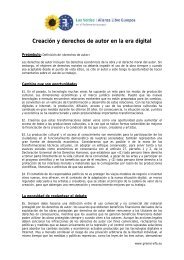Agro-Biotechnology: - The Greens | European Free Alliance
Agro-Biotechnology: - The Greens | European Free Alliance
Agro-Biotechnology: - The Greens | European Free Alliance
You also want an ePaper? Increase the reach of your titles
YUMPU automatically turns print PDFs into web optimized ePapers that Google loves.
34 | Cloned farm animals - a ‚killing application‘? | Need for regulation<br />
5.2 A broader perspective<br />
<strong>The</strong> market for cloned animals for food production seems to be quite small<br />
but its overall impact goes far beyond a niche market of producing and selling<br />
cloned animals. Animal cloning for food production will impact farm and food<br />
production, animal welfare, biological diversity, transparency, traceability and<br />
food safety. It is likely to go further and become a door opener for genetic engineering<br />
in livestock. One other aspect in the context of SCNT is its potential<br />
for encouraging human cloning. <strong>The</strong>se specific concerns were important for the<br />
national legislation in Norway (see below).<br />
Introducing controversial products (such as products derived from the cloning<br />
of farm animals) into the chain of <strong>European</strong> food production without any transparency<br />
is unacceptable to civil society. In the context of the ethical aspects of<br />
livestock engineering Kaiser (2009), for example, points out that:<br />
“When it comes to evaluating the ethics of livestock engineering, science and<br />
technology alone cannot provide the answers, and neither can surveys that<br />
simply mirror emotional reactions of sectors of the public. We need a broad<br />
social debate about the paths that we choose, in particular a debate that pays<br />
respect to ethical arguments and is informed by science.”<br />
Decision making cannot only focus on technical aspects but must take into account<br />
a broader range of concerns. As Gunning (2006) explains this approach<br />
is also required by EU law:<br />
“Risks to human health and the environment posed by animal cloning obviously<br />
raise concerns that need to be addressed. However, in addition to<br />
scientific uncertainty there remains uncertainty about the acceptability of<br />
products from cloned animals. That acceptability may be linked to a number<br />
of other important concerns such as animal welfare, animal integrity, consumers’<br />
rights and, more generally, an interest in promoting the basic values<br />
underpinning the EU (e.g. sustainability, biodiversity) and in promoting the<br />
precautionary principle.”<br />
Recital 19 of Regulation 178/2002/EC concerning basic <strong>European</strong> regulations<br />
of food safety and consumer protection explicitly mentions that societal, economic,<br />
traditional, ethical factors should be taken into account:<br />
“It is recognised that scientific risk assessment alone cannot, in some cases,<br />
provide all the information on which a risk management decision should<br />
be based, and that other factors relevant to the matter under consideration<br />
should legitimately be taken into account including societal, economic, traditional,<br />
ethical and environmental factors and the feasibility of controls.”<br />
Various and very basic concerns are raised by the cloning of animals. Gunning<br />
(2006) mentions animal integrity as an example of the questions connected<br />
with the debate about cloning and SCNT. Animal integrity is a concept which<br />
goes beyond animal welfare. It was also discussed in the context of legislation



